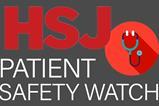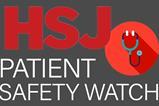HSJ hosts the Patient Safety Watch newsletter, written by Patient Safety Watch chief executive James Titcombe.
Good afternoon and welcome to the latest edition of the Patient Safety Watch newsletter.
Health and social care secretary brands CQC ‘not fit for purpose’
England’s health and social care watchdog is “not fit for purpose”, health and social care secretary Wes Streeting has said, adding: “I have been stunned by the extent of the failings of the institution that is supposed to identify and act on failings.”
The comments follow an interim report, led by North West London Integrated Care Board chair Penny Dash, which found inspections lagged behind their pre-covid level, inspectors lacked clinical expertise, and assessments were inconsistent, as well as problems with the Care Quality Commission’s IT system.
Dr Dash said her interim review “underscore[d] the urgent need for comprehensive reform within the CQC”.
In response, the government has announced several immediate actions, including appointing Sir Mike Richards to review CQC assessment frameworks, improving transparency in the way the CQC determines providers’ ratings, increasing government oversight of the regulator, and asking Dr Dash to “review the effectiveness of all patient safety organisations”.
Dr Dash’s interim report follows the announcement earlier this month of Lord Darzi’s independent investigation into the NHS, which will inform the government’s 10-year plan for the NHS.
Confidence of medical professionals to raise clinical safety concerns declines
Analysis of the 2023 NHS Staff Survey by the National Guardian’s Office has revealed a decline in workers feeling secure in raising concerns about unsafe clinical practice for the second year running, reaching a five-year low.
The analysis showed medical professionals’ confidence in raising clinical safety concerns has also declined from 75.1 per cent in 2021 to 69.4 per cent in 2023.
NHS national guardian Jayne Chidgey-Clark said: “This deterioration in confidence has implications for patient safety. These figures must focus the minds of those who lead healthcare organisations.”
In a separate report, the National Guardian’s Office announced 32,167 cases were brought to Freedom to Speak Up guardians in the 2023-24 financial year, a 27.6 per cent increase from the year before and the highest ever number the Office has recorded. The National Guardian’s Office has suggested this “may signify that other speaking up routes are not effective or trusted”.
One in three services red-rated for baby deaths
The latest Mothers and Babies: Reducing Risk Through Audit and Confidential Enquiries report revealed the proportion of maternity services which are rated “red” for neonatal mortality rose from about a quarter in 2021 to around a third in 2022.
A trust is red-rated when its rates of neonatal mortality – when a baby dies within 28 days of birth – are 5 per cent above its peer group average.
Calling the data “sobering and unacceptable”, Kath Abrahams, chief executive officer of charity Tommy’s, said: “Frankly, we are not on track to meet the current ambitions to make pregnancy and birth safe for all women and birthing people and save babies’ lives.”
Two babies died after the hospital’s medication mix-up
BBC News has reported on an inquest which found babies Elena Ali and Sunny Parker-Propst died within weeks of each other in 2020 after they were given sodium nitrite instead of sodium bicarbonate while under the care of Chelsea and Westminster Hospital.
The coroner said the hospital’s chief pharmacist admitted there had been a “complete and total” failure in checks, while the unit’s neonatal nurse coordinator accepted that, if she had followed a policy to check vials at eye level, she would have been able to see it was the wrong substance.
Chelsea and Westminster Hospital Foundation Trust chief Lesley Watts is quoted by the publication as saying: “We apologise unreservedly for the failings in care provided to Elena and Sunny… We took immediate action to put measures in place to prevent such tragic incidents from happening again.”
Patient safety commissioner seeks input on patient safety principles
Patient safety commissioner Henrietta Hughes has issued a set of draft Principles of Better Patient Safety to aid senior leaders in delivering safer care and reducing avoidable harm. A consultation on the principles is now open, with the hope that the final principles will “provide a clear framework for decision-making, planning and collaborative working, with patients as partners”.
HSSIB report examines GPs’ online consultation tools
The Health Services Safety Investigations Body has published a new report looking at patient safety risks associated with online consultation tools in general practice.
The investigation highlighted several concerns, finding online consultation tools had contributed to patient safety incidents in some cases. Other issues highlighted include an underreporting of safety incidents, inequitable access due to personal circumstances, inadequate training for GPs, and design flaws in the tools.
Recommendations include an evaluation by NHS England, support mechanisms for integrated care boards, and better involvement of patients and staff in tool design.
In the final news section of this edition, we would like to wish a warm welcome to Duncan Burton as England’s new chief nursing officer. I’ve been lucky enough to work with Duncan in the past and can think of no one better for the role.
Sharing some good stuff…
THIS Institute Maternity PPI Panel
THIS Institute is seeking passionate individuals with recent experience of pregnancy and birth in the UK to join their Maternity Patient and Public Involvement Panel, describing it as an “opportunity to the shape the research and ensure it meets community needs and expectations. Your voice can drive meaningful change.”
Regular readers will know I’m a big fan of everything that THIS Institute does and I’ve no doubt this will be a fantastic opportunity to contribute to meaningful and much-needed work that will make a real difference. You can apply to join the PPI Panel here.
THIS Space 2024
THIS Space – the THIS Institute’s fantastic annual conference – is taking place on 26 November. The event is open to anyone with “an interest in the evidence for improving the quality and safety of healthcare” and aims to share learning on what works in healthcare improvement, stimulate innovation, and explore imaginative ways of understanding problems, as well as connect people with the common goal of improving healthcare.
Early-bird registration is now open. The event is free to attend, but places must be booked.
Countdown to Congress!
This year’s HSJ Patient Safety Congress – focusing on “Honest Conversations: Creating Safety in a System Under Pressure” and chaired by The Sunday Times health editor Shaun Lintern – is now less than two months away.
The key healthcare event, held in Manchester Central on 16-17 September, includes an impressive range of topics covering 11 content streams, including safety across the system, human factors, workforce wellbeing, mental health, virtual care, Patient Safety Incident Response Framework and leveraging AI. If you want to explore more conversations on patient safety, check out the Patient Safety Congress and book today.
The Nye Bevan Leadership Academy Programme
I had the privilege of being a guest speaker at a Nye Bevan leadership programme graduation ceremony in London last week. A huge congratulations to all the graduates, with a special mention for Jono Broad, who I think is the first person who started as a patient leader to complete the programme – a fantastic achievement.
If you haven’t heard of the Nye Bevan programme, you can find out more information here.
On the subject of patient leadership, the final share for this edition is a mention of a truly valued and inspiring colleague, David Gilbert. No one has done more to raise awareness of the need for and value of patient leadership than David. If you don’t already subscribe to his newsletter, you can do so here (it’s full of great insights and news – HSJ also sends out an abridged version to Daily Insight subscribers). David also runs fantastic leadership courses.
That’s all for this edition, but before signing off, a few final thoughts from me.
The government’s statements on the CQC highlight the urgent need for reform. Candour about problems and the promise of change are welcome, but it’s also crucial to remember the lessons from past NHS reforms to avoid repeating mistakes.
The news that NHS staff are feeling less secure in raising concerns about unsafe clinical practice underscores a systemic issue that needs addressing at all levels, from frontline staff to regulators (professional and system), right up to the Department of Health and Social Care. Creating a culture of openness and transparency is essential and must be addressed at all levels, especially during periods of change.
In the words of Florence Nightingale: “How very little can be done under the spirit of fear.”
Thank you for reading, and stay safe. Look out for our next newsletter in two weeks.
James Titcombe
































No comments yet